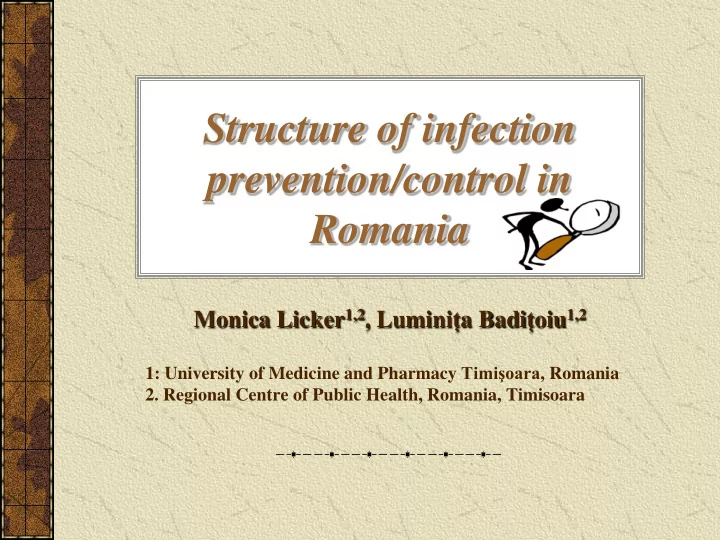

Structure of infection prevention/control in Romania Monica Licker 1,2 , Lumini ţ a Badi ţ oiu 1,2 1: University of Medicine and Pharmacy Timişoara , Romania 2. Regional Centre of Public Health, Romania, Timisoara
Romanian National Legislation The Health Minister's Order no. 916/2006 - Approval of the Nosocomial Infection Monitoring, Prevention, and Control Norms in Healthcare Units The Health Minister's Order no. 914/2006 - Guidelines regarding hospital conditions needed for sanitary license The Health Minister's Order no. 261/2007 for Technical guidelines regarding cleaning, disinfection, sterilization in healthcare settings
Nosocomial Infection Prevention and Control (NIPC) department The NIPC department activity in Romania is organized at the level of each hospital or inpatient healthcare unit. The legislation (Order 916/2006) correlates the NIPC department staff number with the type of hospital and therefore, indirectly, with the number of inpatient beds: County hospitals City/town hospitals Other units
Team constitution A. In county hospitals, university hospitals, NIPC department consists of: 1 Epidemiologist/microbiologist – in charge of the service 1-2 nurses 1 person fulfilling administrative tasks 2 clinicians (with medical and surgical specialty) 1 pharmacist; B. City, town, and communal hospitals, with a minimum of 3 jobs: 1 medical specialist 1 nurse 1 properly qualified worker C. Other inpatient units than the ones specified under A/B, as well as ambulatory healthcare units, primary care units with daytime beds, sanatoria – must appoint: 1 own-staff, part-time physician responsible with the activity of the NIPC department.
Qualification or competencies of the staff Physician (graduate of a Romanian medical university) specialized in: Epidemiology Microbiology Infectious diseases If the above mentioned are unavailable, a physician with a different specialty shall be appointed (neonatologist, paediatrician, ob-gyn) subject to completion of a specific professional training organized by the county public health authority/the Bucharest public health authority or the Regional Centre of Public Health Nurses: Specialized in hygiene (title included in Law 307/2004)/general medicine or employed at the central sterilization station, for neonatology, OB-GYN wards, subject to completion of a similar training to the one mentioned above.
Medical education There are continuous medical education programs for both physicians and nurses, which require the accumulation of a certain number of points over a limited period of time, whether NIPC-related or not: at least 200 points/5 years for physicians, at least 30 points/year for nurses. The National School of Public Health has a 3-month training programme for nurses (including the topic of nosocomial infection management) - for healthcare nurse managers.
Recommendation Master studies are needed, because neither epidemiologist, clinical microbiologist, or other clinical specialists have enough knowledge when they are coming from the university; Reestablishment of hygiene specialty for nurses , previously existent, which is more suitable in the NIPC department, than the general nurse (universities have only general medicine, Ob-Gyn, laboratory technicians, radiology nurse specialization) A better team work between epidemiologist, clinical microbiologist, clinical medical staff is needed; relationships are going bad because of their pride; Preventive medicine funds need to be supplemented – they have been the first to be cut because of the economical crisis; also, medical and cleaning staff need to be supplemented;
Reality In fact, the medical healthcare manager has a lot of duties, and works as a permanent link with the hospital top management; In hospitals with outside departments, usually there is a clinical specialty doctor delegated with duties in HAI, in direct link with hospital NIPC department; Also, in clinical departments chief nurses have a lot of duties in HAI surveillance/prevention and control and could be considered as link nurses.
Chief Nurse Implement healthcare practices for infections control; Initiate patient isolation; Limit patient exposure to infections derived from visitors; Identify nosocomial infections ; Investigate the type of infection and aetiological agent, together with the physician; Participate to the professional training of the personnel; Participate in the epidemics investigation; Assure communication with institutes of public health and other authorities;
Reality At present , the activity of NIPC in Romania suffers not because of legislation or medical staff, but due to non implementing of legal procedures, constant lack of funding and lack of team work; The existence of a link staff between clinical departments and NIPC would help for a better collaboration between the two parties; The first priority would be the improvement of the present system with legal requirements respected by all actors involved.
Recommend
More recommend